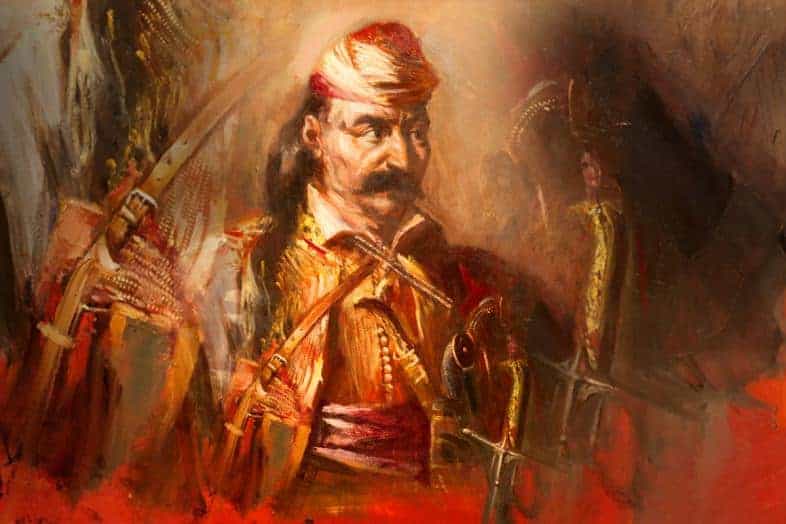Theodoros Kolokotronis (Θεόδωρος Κολοκοτρώνης) was one of the most prominent figures of the Greek Revolution of 1821.

Kolokotronis along with his two brothers, joined the Peloponnesian guerrilla band when he was only 15.
His first battle against the Ottoman Empire was at Valtetsi, a village near Tripoli. In 1821, before the outbreak of the war, Kolokotronis created a klepht band of people attempting to organise them into an army of soldiers. This was an army of Greeks who had knives as weapons and very few carried guns. They were mostly inexperienced because they were slaves during the Ottoman occupation and had no right to have weapons or ride horses.
On April 24, 1821, commander of the Ottoman garrison Kehayabey Mustafa, set out to stop Kolokotronis with his armed force of 12,000 men against 2,300 revolutionaries.
Kolokotronis entered the battle with his 700 troops and together they repelled the Ottoman army, who retreated, and were victorious. This was the first decisive Greek victory during the war and helped to strengthen Greek morale and self-confidence.
His greatest success was the defeat of the Ottoman army under Mahmud Dramali Pasha at Dervenakia in 1822. He started the campaign in Nafplio leading an army of Greek soldiers against Dramali and his Turkish troops, who occupied the acropolis. Dramali and his troops eventually retreated and were hoping to reach Corinth by taking the Dervenaki Pass. It was here that the Greek forces successfully defeated the Ottomans. Kolokotronis would then return to Nafplio and finally captured the fortress in December 1822. It was said that Kolokotronis rode his horse up the slopes of the Kastro Palamidi to celebrate his victory in Nafplio.
In 1825, Kolokotronis was appointed commander-in-chief of the Greek forces in the Peloponnese.
He was a big supporter of Kapodistrias and his policies and was a leader during the events of Otto’s enthronement. However, in 1833, he had a serious conflict with the Regents, eventually sending him and other heroes of the Revolution to prison in Nafplio, charged with treason. In 1834, he was sentenced to death, but after Otto’s coming of age, he received a royal pardon and became an “Advisor of the Country”.
During the last years of his life, Kolokotronis dictated his Memoirs to Georgios Tertsetis, which were published in 1851 under the title 'A Narration of Events of the Greek Tribe from 1770 to 1836'. This book has been an invaluable source of knowledge around the Greek Revolution of 1821.
Kolokotronis passed away on the February 4th, 1843, in Athens, a day after his son’s Konstantinos wedding.

